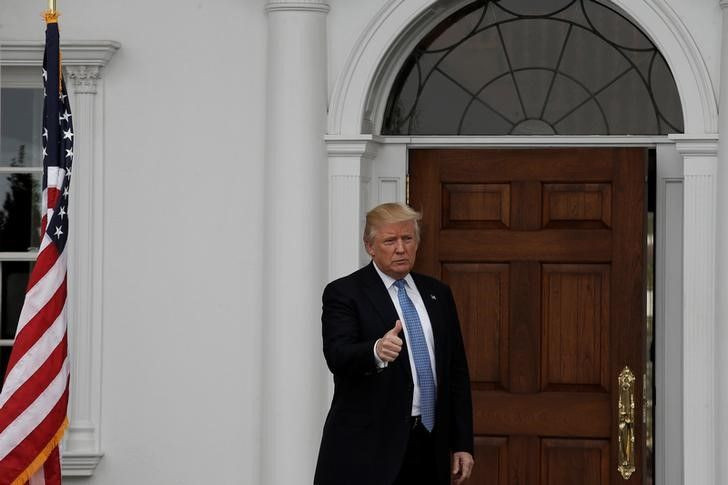Controversial Donald Trump Donor Peter Thiel Pushes For FDA Head Who Has Financial Ties To Healthcare Industry

Silicon Valley billionaire Peter Thiel gave Donald Trump’s presidential campaign a $1.25 million boost during the homestretch of the 2016 campaign. Now, Thiel appears to be pressuring Trump to appoint one of his business associates to run the Food and Drug Administration (FDA).
The tech billionaire wants Jim O'Neill, managing director of Thiel-backed Mithril Capital Management, to run the agency responsible for regulating over a $1 trillion in medical and food products every year, Bloomberg and Politico are reporting.
O’Neil would be the first head of the FDA to have no medical or scientific background. He also has strong financial links to the very industry he would be in charge of regulating: Mithril, which recently raised $600 in capital, invests heavily in healthcare technology start-ups that require FDA approvals to be profitable.
“He brings strong ties to industry and would reflect a tremendous bias in their favor at the FDA,” Dr. Michael Carome, director of the public health research group at the consumer watchdog Public Citizen, told International Business Times. “He’s senior executive in a hedge fund investing in medical healthcare products. That alone should be disqualifying.”
O'Neill has worked with Thiel-backed funds since 2008. Before that, he worked for the George W. Bush administration, first as a speechwriter in the department of education, and later in the department of Health and Human Services.
Like Peter Thiel, O'Neill identifies as a libertarian, and is intensely skeptical of any government intervention in the marketplace. He’s suggested that humans should be allowed to sell their organs on the open market. He serves on the board of the Seasteading Institute—a group that aims to create libertarian communities on boats, free from any government oversight.
In the private sector, O'Neill has a clear financial stake in the outcome the regulatory process — a process he could oversee as head of the FDA.
For example, in 2014, Mithril invested $15 million in the German medical device company MagForce — which manufactures cancer treatment technologies — in exchange for 23 percent ownership in its U.S. subsidiary. In June, the company announced it filed for an “Investigational Device Exemption” with the FDA — basically a permit to use its unapproved product to gather evidence for clinical trials. MagForce’s profitability could very well hinge on how the FDA regulates its products: According to 2015 financial filings, MagForce is “working with the FDA to update preclinical studies, which were conducted approximately ten years ago, to current US regulatory standards.”
O'Neill has made his views on the FDA’s approval process clear. At a 2015 biotechnology conference, where he praised MagForce cancer technology as a potentially life-saving treatment, he said FDA regulations “kill a lot of people” by delaying the approval of drugs to the market.
Daniel Carpenter, a professor of government at Harvard who studies the history of the FDA, says O'Neill's comments indicate he’s misinformed and underqualified for the top FDA job.
“There’s never been an FDA commissioner who doesn't have an M.D. or, at least, a PhD in relevant sciences such as chemistry or pharmacology,” he told IBT. “We could have a situation here where — if O’Neil’s put in charge—the credibility of the U.S. pharmaceutical market craters.”
O'Neill's views on how medical products should be regulated are also outside the norm: He wants drugs to be brought to market before they’ve been proven to work. “We should reform [the] FDA so there is approval of drugs after their sponsors have demonstrated safety — and let people start using them, at their own risk,” O’Neill said at the 2014 biotechnology conference. “Let’s prove efficacy after they’ve been legalized.”
“That’s preposterous and dangerous and reflects a fundamental lack of understanding about medical science,” said Dr. Carome. Key safety information, Carome said, is learned in the later stages of clinical trials. Releasing a drug to market before it’s been fully tested could create a “tremendous danger to public health.”
O’Neill has advanced the industry talking point that the FDA’s regulatory framework stifles innovation. At the 2014 talk, he said that safety regulations do “harm to the economy.”
“There’s zero evidence for that,” Carpenter told IBT. “There’s no good social science behind the idea that the FDA is killing innovations—none.”
Dr. Aaron S. Kesselheim, associate professor of medicine at Harvard Medical School and the director of Brigham and Women’s Hospital program on regulation, therapeutics, and law, says O’Neill’s proposals could transform the drug market into an unregulated space that resembles the vitamin and supplement market. “You’d have all these expensive products out there without being shown to work while presenting substantial safety risks — and being pushed on physicians and patients by overzealous marketing,” Kesselheim told IBT.
“He’s coming at things from an agenda-driven and non-evidence -based point of view,” Kesselheim said. “That should be very scary for patients and physicians.”
© Copyright IBTimes 2024. All rights reserved.





















